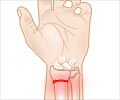Patients who underwent bariatric surgery appear to have an increased risk for fracture compared with the general population.

"A negative effect on bone health that may increase the risk of fractures is an important consideration for people considering bariatric surgery and those who have undergone bariatric surgery," said lead author Kelly Nakamura, a medical student at Mayo Clinic College of Medicine in Rochester, Minn.
Nakamura reported the final analysis of research presented two years ago in a small subset of the 258 patients included in this study. This full analysis showed that patients who had bariatric surgery have 2.3 times the chance of fractures compared with the general population, as opposed to the 1.8-fold increased risk found initially.
Patients who had bariatric surgery had an increased risk of a fracture at nearly all skeletal sites studied, according to the authors. The chance of breaking a foot or hand was especially high—about three times what would be expected, Nakamura said.
For comparison, the investigators studied the patients' actual fracture rates reported in their medical records versus the expected fracture rates among people of the same age and sex living in the same county in Minnesota. Patients underwent bariatric surgery at Mayo Clinic Rochester between 1985 and 2004, with 94 percent of patients having a gastric bypass.
A total of 79 patients had 132 fractures during an average follow-up of nine years, the authors reported. On average, they experienced their first fracture about six years after surgery. This is a time when their primary health care provider, rather than their surgeon, usually is responsible for their care, said the study's principal investigator, Kurt Kennel, MD, an assistant professor of medicine in the endocrinology division at Mayo Clinic.
Advertisement
"Clinicians may need to consider measures to optimize bone health and reduce fracture risk after bariatric surgery, such as fall prevention and optimizing calcium and vitamin D nutrition," he said.
Advertisement
Source-Eurekalert














